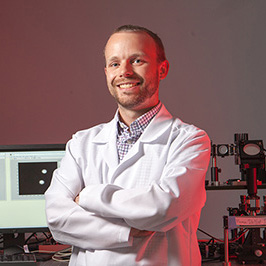Timothy Muldoon
 Associate Professor of Biomedical Engineering
Associate Professor of Biomedical Engineering
M.D., Baylor College of Medicine
Ph.D., Bioengineering, Rice University
B.S., Biomedical Engineering, Johns Hopkins University
tmuldoon@uark.edu
In his own words ...
Every day I try to … learn something new.
If I weren’t teaching I’d be … If I could do anything in the world I’d be an astronaut!
To keep myself healthy, I … follow what we know to be common sense guidelines. I try to eat vegan one day a week, exercise three to five times a week. If something sounds too good to be true, it probably is –– be cautious about the trendy things you read, when it comes to health.
About his research:
Timothy Muldoon and his research team are developing advanced endoscopic imaging tools – small, handheld probes that use light to detect cancer cells early and study how they grow. He’s currently focused on mouse studies of colorectal cancer, but thanks to dual degrees in medicine and bioengineering, Muldoon brings a big-picture understanding to a complicated field. During one session of his Honors College Signature Seminar on cancer, topics ranged from the challenges of screening and the attendant risks of over diagnosis and overtreatment to advances in biomarker research and robotic surgery.
Muldoon also takes care to discuss the social aspects of cancer with his students.
“It’s jarring to see disparate outcomes – lower survival rates for people of lesser means, especially when you’re focused on the science – the fancy drug, the fancy technology,” he said. “How are we employing these in the system to maximize the benefit for the most people?”
Muldoon grew up in Detroit, where the emphasis was on the automotive, but guided by his love of high school biology and calculus, he enrolled in one of the first biomedical engineering programs in the country, at Johns Hopkins University. He was the first in his family to attend a university and went on to earn both a Ph.D. and M.D. He originally planned to be a “true physician/scientist” but over time, decided that combining grant-funded research and clinical practice was a stretch in his particular field. “The most valuable thing about the M.D. is that it has helped me form collaborations with clinicians and helped me ask better, more relevant research questions,” he said.
Muldoon has coauthored papers with seven honors students since arriving on campus in 2012. Currently his team is exploring different aspects of immunotherapy. One group is developing a clinical method that will allow doctors to predict the unique response of a patient’s tumor to drug therapy. In another study, students are introducing an antibody that blocks macrophages from entering tumors. These infection-fighting white blood cells transform within a tumor, sending out messages to increase tumor cells, break down surrounding tissue and increase blood flow to the tumor. “We’ll use a new form of endoscopy to see the early stages of the macrophage blockade and to study blood flow to the tumor. There’s a lot of coordinate, and a lot of work to be done, but some of the initial research looks pretty good.”